LOD, Israel — Competing narratives usually lie uneasily next to one another in this central Israeli city. A modern synagogue on one corner stands yards away from a 13th century mosque. A 19th century Greek Orthodox church is just steps away.
Last month, these competing images of Israel burst into the open with devastating force.
As Israel traded fire with militants in the Gaza Strip, rival Jewish and Arab mobs battled each other in the streets of Lod for just over a week. Homes were attacked, cars were torched, Muslim graves were defiled, and synagogues and Jewish religious books were burned. A 32-year-old Israeli Arab man and a 56-year-old Jewish man were killed, and dozens of other people were injured.
While the streets now are largely quiet, the police and local residents said some isolated incidents are still happening.
Residents of this mixed city of 80,000, which is tucked behind Ben Gurion Airport, are still reeling after years of underlying mistrust metastasized into outright violence. The strife speaks to bigger forces swirling around Israel as it tries to reconcile competing identities and versions of history.
‘Strong hate that burst out’
Orthodox Rabbi Itamar Ben-Yaakov hasn’t let his son Dvir, 9, out alone to ride his bicycle around the neighborhood since the mobs roamed the streets. Instead, Dvir plays with his six siblings and the children of the five other families who live in this shabby complex shut away from the world behind a padlocked gate.
“We knew that they didn’t like us,” said Ben-Yaakov, 40. “But the strength of how much they hate us, it was a strong hate that burst out.”
Lod was never a truly integrated community, but until recently it had been a peaceful one. Arabs and Jews weaved their lives around one another here, crossing paths in the workplace, some schoolyards and the foyers of mixed apartment buildings. While they remained largely separate — each community has a different name for the city, with Jews calling it Lod and Israeli Arabs calling it Lyd — daily life ticked by without much trouble.
Things were working out for Ben-Yaakov, who is employed by the Torah Nucleus in Lod, a group of religious Zionists who aim to boost the Jewish population in the down-at-the-heels city.
Ben-Yaakov said that he moved to Lod three years ago and that since then the area had seen real improvements and that his community of around 70 families in the predominantly Arab neighborhood of Ramat Eshkol was thriving.
But it was here that much of the fighting took place, and when NBC News visited last month, quiet had enveloped the deprived neighborhood. The scars of fighting were evident in a charred watchtower by the marketplace, the broken glass underfoot and the heavy presence of border police.
About a week after most of the fighting in Lod ended, only 50 of the families in Ben-Yaakov’s community had returned to the city, having fled for safer ground as neighbor turned on neighbor. Some, Ben-Yaakov said, had decided to move away for good.
The first Torah Nucleus families moved to Lod in the 1990s, according the group’s website, which described its community as a “social-Zionist initiative” that aims to develop the city through integration and efforts to improve education, culture and social welfare.
But Israeli Arabs living in Lod accused Jewish newcomers, without naming the Torah Nucleus specifically, of having a more unsettling objective — changing the demography of the city to make it more Jewish by displacing Arabs. It is an accusation that Jewish residents of Lod firmly denied.
Ben-Yaakov said he was shocked at the depth of anger many of his Arab neighbors felt. Israeli Arabs who spoke to NBC News said that they, too, were shocked by the violence but that in their minds it had historic roots that stretch to the creation of Israel.
‘They didn’t come peacefully’
Ramadan Mabruk Hassuneh was 15 years old when Jewish soldiers entered the Palestinian community of Lydda on July 11, 1948, which Israel later renamed Lod. The next day, he said, his family joined a long line of Palestinians trudging out of the city on foot.
“They didn’t come peacefully,” Hassuneh, now in his 80s, who lives in a modest house with his wife and cats and uses a mobility frame to help him walk, said of the Jewish forces.
Overnight, like hundreds of thousands of Palestinians who fled or were expelled from their homes during the 1948 Arab-Israeli War, he found himself headed for an uncertain future, unsure whether he would ever return home.
Historian Alon Kadish, who teaches at the Hebrew University, said about 19,000 Arabs lived in the town, named Lydda by the British, when Jewish troops arrived July 11. Most were Muslims, alongside around 2,000 Christians who were mostly Greek Orthodox, he said.
The next day, most of the population left the town, many for refugee camps near Ramallah in the West Bank, and only a few thousand remained, he said. Later, some of those who left would end up in Jordan, he said.
For Palestinians throughout Israel, the West Bank and the region, the establishment of the state of Israel was a disaster. Some returned home, but decades and generations later, many are still refugees in the Gaza Strip, the West Bank and neighboring countries.
In Lod, as in other communities, many say they fear a renewed effort to push Arabs out of the city. Last month’s violence and recent high-profile moves to evict Palestinian residents of east Jerusalem, they said, prove that many of their Jewish neighbors are hostile and don’t want them here.
Israeli Arabs say the mentality of Jewish Israelis, like Ben-Yaakov, who want to strengthen the Jewish community in Lod, has made them increasingly uneasy. They fear that many of the Jews who have moved to the town recently are trying to slowly chip away at their presence in the city.
“They insist on getting into the Arab neighborhoods not because they want to live in coexistence with Arabs and to have Arab neighbors,” said an activist for the Arab-Jewish Hadash party, Maha al-Naqib, a former member of Lod’s city council. “It’s just because they have an ideology to kick out the Arabs.”
Israeli Arabs are afraid that Lod could become the next Sheikh Jarrah, where Palestinian families are threatened with eviction from their homes by Jewish settlers, or the volatile West Bank city of Hebron, where ultranationalist settlers live in heavily fortified enclaves in the city center.
Many of the Israeli Arabs in Lod describe the new Jewish arrivals as settlers — a word commonly used to describe Jews living in settlements in the Israeli-occupied Palestinian territories. Most countries consider the settlements to be illegal and an impediment to peace.
“To be a settler, it doesn’t just depend on the geographic place where you live. It’s an ideology. It’s a behavior,” said al-Naqib, 50, a Lod native.
Jewish newcomers in Lod strongly deny that they have come to push Israeli Arabs out and reject the word “settler,” pointing out that they live inside Israel. Instead, they say, they moved here to better the community for both Jews and Arabs and to bolster the pre-existing Jewish community.
As for the history, Jewish Israelis pointed back much further to biblical times to highlight their connection to the land. Kadish said a Jewish community remained in Lod after the destruction of the Second Temple in 70 A.D. but gradually declined and finally disappeared during the Byzantine period.
“Lod was a Jewish city 2,000 years ago,” Ben-Yaakov said. “Our story does not begin 70 years ago, but from our patriarch, Abraham.”
‘Common ground’
Al-Naqib, the civil rights activist, was among many Israeli Arabs who blame Mayor Yair Revivo for the growing number of right-wing Jewish residents in Lod.
Israeli Arabs accuse Revivo, a member of Prime Minister Benjamin Netanyahu’s right-wing Likud party, of not investing equally in public services and of discriminating against them by shutting down protests and complaining about the volume of the Muslim call to prayer.
Yehoram Ben Arosh, the Lod municipality spokesman, said Revivo has called for calm and asked all residents to avoid violence and instead choose “dialogue, friendship and fraternity.”
He said the municipality has invested more than 550 million shekels ($169 million) to improve the quality of life in Arab areas in the last seven years, investing in education, infrastructure and sports, among other things.
As for recent Jewish arrivals, they came to Lod on their own initiative and “not to uproot Arab residents but to find connection and common ground,” he said.
Ben Arosh didn’t respond when asked how the investment in the Arab communities compared to investments in Jewish ones.
Ranin Abu Sharekh, 33, an elementary school teacher, said that the municipality could say all it wanted about investment in Arab communities but that ultimately schools remained in bad shape, without adequate play facilities, and that the streets in Arab neighborhoods were potholed.
“The Arab areas are neglected,” she said.
United and divided
It isn’t just in Lod that Israeli Arabs complain of discrimination.
Israel’s 2 million-strong Arab minority are about 20 percent of the country’s population of 9.2 million. Descendants of Palestinians who stayed in the country after 1948, they are Israeli citizens, but many identify with the Palestinian cause.
They are increasingly present in professional jobs from medicine to microfinance, but they also face discrimination in areas such as housing and budget allocation, said Adalah, a human rights organization and legal center.
Israeli Arabs have been vilified by Netanyahu in recent elections, and they complain about being second-class citizens, pointing to legislation such as the 2018 nation-state law, which stripped Arabic of its status as an official language alongside Hebrew and declared that only Jews have the right to self-determination in Israel.
They often compare their experience to that of African Americans in the United States.
But with division comes unity, and in Lod, both Arab and Jewish Israelis spoke about how the recent violence had united their communities.
Abu Sharekh said the Israeli Arab community pulled together during the violence, setting up WhatsApp groups to warn one another of the location of the Jewish mobs.
Now that the immediate threat of violence was subsiding, she said, the community was organizing itself to fight for its rights, support Arab businesses and better educate Arab children about Palestinian history.
“There can’t be coexistence when one side has rights and the other side is discriminated against,” she said.
Similarly, Ben-Yaakov said that in the wake of the violence, his community felt bolstered by the knowledge that it had friends all over Israel.
During the unrest, Jewish residents of the city said they’d asked other Jewish Israelis from across Israel and West Bank settlements to travel to Lod to protect their homes from Arab mobs.
“We are united and have each other’s backs,” he said.
For now, at least, the sentiments suggest that neither side is ready to reach out to the other. But there are some flickers of hope.
In a Jewish community outside Lod, Efi Yehoshua, the brother of Yigal Yehoshua, an electrician who was killed when a stone hit his head during the rioting last month, had a different reaction to the violence.
Yehoshua, 58, said he wants people from both communities to work to promote tolerance and education so such scenes are never repeated. He said he is looking particularly to religious leaders and teachers to promote coexistence and to calm things down.
“Whoever doesn’t agree to live in peace will lose,” he said.
As for his brother, whom he described as an open-minded man who was well integrated with the Arab community in Lod, Yehoshua said, “He was the wrong person to be at the wrong place at the wrong time.”
He added that he and his family were extremely happy that one of Yigal’s kidneys had been given to an Arab woman.
“We were very emotional about it,” he said.
But Yehoshua’s voice is being drowned out by anger and fear.
Ben-Yaakov’s answer was emphatic when he was asked whether he would let Dvir play with Arab children in an effort to build relations between the two groups for future generations.
“Would you want your children to play with the people who tried to kill you?” he asked.

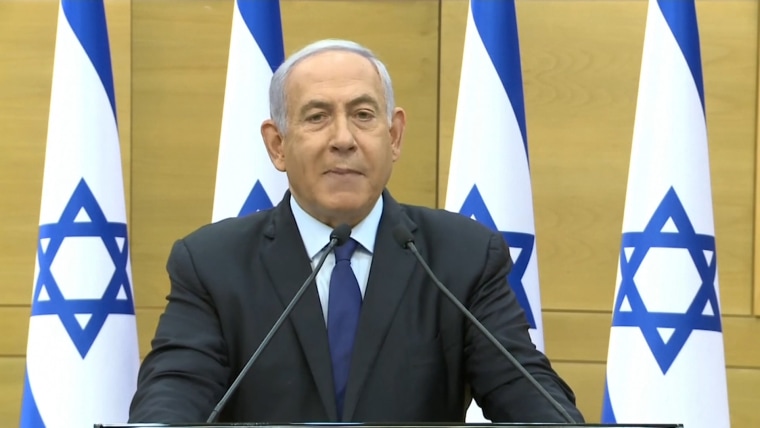
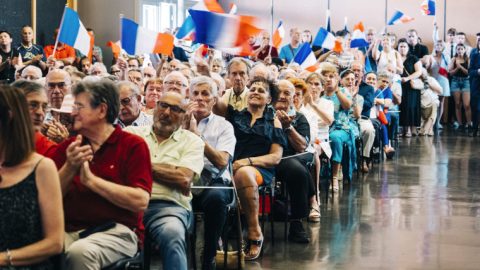
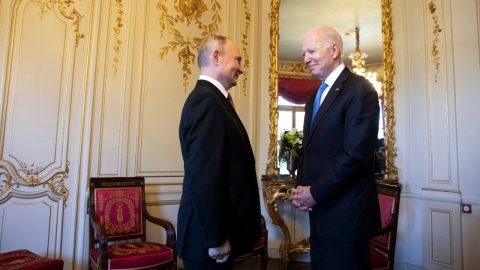
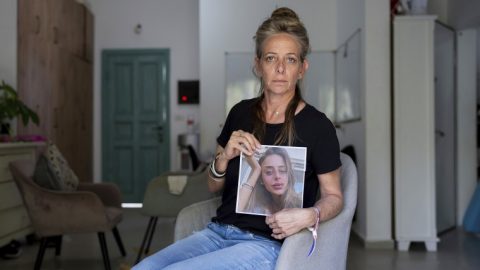
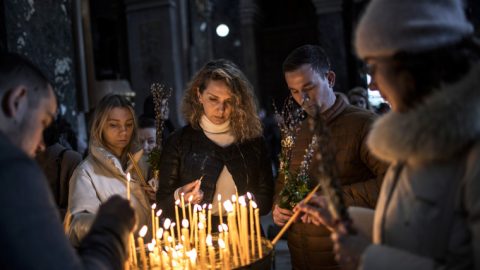

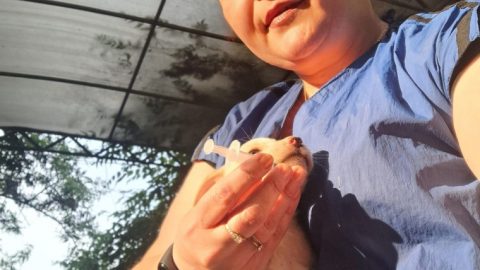
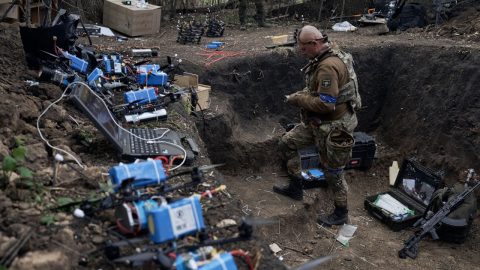

Recent Comments